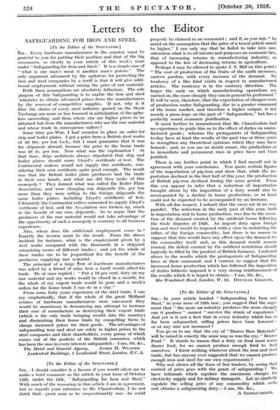Letters to the Editor
SAFEGUARDING FOR IRON AND STEEL
• [To the Editor of the SPECTATOR.] SIR,—Every hardware manufacturer in the country must be grateful to you for putting their position and that of the big consumers, so clearly in your article of this week's issue under " Safeguarding for Iron and Steel." It is a simple case of " what is one man's meat is another man's poison." The only argument advanced by the agitators for protecting the iron and steel companies by a tariff is that it will give addi- tional employment without raising the price of raw material.
Both these assumptions are absolutely fallacious. The sole ,purpose of this Safeguarding is to enable the iron and steel 'ndustries to obtain advanced prices from the manufacturers by the removal of competitive supplies. If not, why is it that the shares of every steel industry quoted on the Stock Exchange are more or less boomed in anticipation of the agita- tors succeeding, and from where else are higher prices to be obtained but from the manufacturers who use the raw material and whose trade in consequence suffers ?
Some time pre-War, I had occasion to place an order for ship and boiler plates. I got a price from a British steel works of £6 10s. per ton f.o.b., but I must guarantee that it was for shipment abroad, because the price to the home trade was £8 5s. per ton. Now what was the explanation ? At that time, ships architects always stipulated that ship and boiler plates should carry Lloyd's certificate of test. The Continental makers would not supply this certificate, con- sidering their own certificate quite good enough. The result was that the British boiler plate producers had the trade in their own hands, and what use did they make of this monopoly ? They formed what was called the Boiler Plate Association, and were charging our shipyards 35s. per ton more than they were selling to the foreign shipyards the same boiler plates, including Lloyd's certificate of test. Ultimately the Continental rollers consented to supply Lloyd's certificate of test, and the Association was broken up, much to the benefit of our own shipyards. So to argue that the producers of the raw material would not take advantage of the opportunity of such a monopoly is contrary to all business experience.
Also, where does the additional employment come in ? Exactly the reverse must be the result. From the above incident for instance, what is the employment given by a steel works compared with the thousands in a shipyard comprising scores of different trades ; and yet the whole of these trades are to be jeopardized for the benefit of the producers supplying raw material.
The principal of a large Ann of hardware manufacturers was asked by a friend of mine how a tariff would affect his trade. He at once replied : " Put a 10 per cent. duty on my -raw material and my works would be closed in a month, for the whole of my export trade would be gone and a week's orders for the home trade I can do in a day."
From some forty years experience of the steel trade, I can say emphatically, that if the whole of the great Midland centres of hardware manufacturers were canvassed they would be unanimous in denouncing any attempt to increase their cost of manufacture as destroying their export trade (which is the only trade bringing wealth into the country) and diminishing their home trade by compelling them to charge increased prices for their goods. The advantages of safeguarding iron and steel are solely in higher prices to the steel companies and their shareholders, every penny of which comes out of the pockets of the British consumer, which has been the case in every interest safeguarded.—I am, Sir, &c., The Metal and General Agency, JAMES H. WEAGER.
. Leadenhall Buildings, 1 Leadenhall Street, London, E.C. 3.






























































 Previous page
Previous page